Why You Should Maybe Keep Your Crush A Secret
Over on FetLife, I wrote about how I often don’t tell women about the crushes I have on them, and got a lot of responses that were all like, “Oh, no, Ferrett! If you have a crush on someone, you should tell her!”
No; no, I really shouldn’t. And maybe, neither, should you.
Now, one a personal level, I have the issue that I crush easily, trivially, sillily; I can form a mild crush over a series of pretty pictures or one knock-my-socks-off blog post. My crushes are ethereal things – and though I hold them tight to my heart, if I told every woman I had a crush on, I’d probably spend my days in entangled in embarrassing correspondence. (A correspondence I most likely wouldn’t have time for, because honestly my poly web is pretty full as it is.)
Yet even if I did not crush easily, it’d still be a dick move to drop the crush on random people, because here’s the thing:
Telling someone you have a crush on them is an obligation.
If I go to you and say, “I have a huge crush on you,” that forces you into a situation where you have to respond. Someone’s showed up on your doorstep and dropped a big load of Unexplored Feelings on you, very like a load of dirty laundry, and now you have to do something with that.
And it’s potentially really awkward for the crushee, especially if s/he doesn’t feel the same way back. It hurts for you when your crush gives you the “no thanks,” but there are precious few people in this world who like dashing people’s expectations. And then that poor person has the stress of trying to figure out how to gently let you down –
– or whether they can afford to let you down.
Forrest Gump knew a thing or two about crushes: they’re like a box of chocolates, you never know what you’re gonna get. Now, my particular crush is the kind where if you tell me, “Not interested,” I’ll shrug and ask you to a movie next week anyway, because I’ll still like you buckets even if we never do the smoochy-smooch thing.
Yet here’s the thing: even if I tell you all of that up-front, you have no guarantee I am who I say I am.
Because I could be the kind of dude who’s all like, “WHAT? You don’t like me?! Well fuck you, I never wanted your friendship anyway” and then never talk to you again – thus ending a friendship that you valued, but didn’t have the chemistry of attraction in it. Or I could be the kind of creeper who never expected that you would turn me down and so meets your “no” with a seething outrage, marking you as The Enemy for leading me on, determined to fuck you over now for breaking my heart.
Or I could be that kind of guy who shrugs it off with a “Sure, sure,” and then waits until you’re drunk to see if maybe you were lying about that whole crush thing. Or I could be the dude who thinks you’re playing the happy-little denial game, and you get to watch as I move into full-on stalker territory…
Or maybe – and this is often the best-case scenario – despite all of my protests about how I’ll still totes like you anyay, once the attraction is defeated, our friendship subtly mutates from the happy evenness of “We’re buddies!” to “You hold a power over me that I do not hold over you!” and things turn terribly awkward and sad.
The problem with crushes is that people handle doused crushes in all sorts of astoundingly bad ways – and your crushee has no guarantee of how you’ll react. A dropped crush is often a variant on Schrodinger’s Rapist, where the concern of not knowing how you’ll react instills a lot of anxiety as they try to figure out just what your real intentions are. As such, dumping that crush on them just on the off-hand chance s/he might be into it is the height of bad manners. It basically says, “Fuck it – I’ll stress you out if it means I’ve got a shot of getting into your pants.”
Now, I’m not saying to never reveal your crush, because the “quietly suppress all attraction until their defenses are down” is a game played by sad jamooks everywhere. What I am saying is that I’ve met enough people – maybe not a majority of them, but enough to matter – to know that a lot of people are really discomfited when someone expresses a crush out of nowhere.
As such, I suggest that until you know they feel otherwise, consider restraining your crush.
Yes, I understand that’s more work, sifting through your interactions for signs of attraction and weighing the evidence until you come to the conclusion that they’re a) maybe possibly kinda into you, or b) maybe possibly the sort of person who’d be flattered even if they don’t respond in kind.
But the alternative is you saying, “I DON’T CARE WHAT THE FUCK THEY WANT! I WANNA SMOOCH! SO I’M JUST GONNA TELL ‘EM RANDOMLY ON THE OFF-CHANCE THAT I GET WHAT I WANT!”
There’s a word for that, and that word is “douche.”
As a general rule, until you get some signals that someone would like something – and people are emitting signals all the time if you watch carefully – it’s not a bad rule to default to not doing that thing until you know for sure they want that thing. That default behavior applies whether it’s kissing, crushing, helping someone across the street, informing them that they should dress better, touching their hair, offering diet advice, or any range of unasked-for “helpfulness.”)
Old Uncle Ben knew about crushes: “With great crushing comes great responsibility.” If you have inclued the signs that s/he is potentially into you, then fine! Take a rational shot. You’d be surprised how often there is a mutual crushitude if you suspect there might be one. But only do it if you’ve scouted the territory.
Which is why me, sighing over a couple of pretty photos isn’t grounds enough to drop the crush. Me, having been dazzled by an essay or two, isn’t grounds enough either. I should open up a conversation, do some back-and-forth, see if we’re actually compatible before going that route.
Other people asked, “Well, if I have a crush on someone, it’s going to affect our relationship! Shouldn’t I tell them, rather than swallowing my emotions?” And yes, there are circumstances where you’re desperately in love with your best friend and need him to know, and then you maybe should just to get that out in the open where it won’t fester.
But a lot of douches do that as a way of saying, “If you’re not fucking me, then I don’t need you in my life – so are you in?” In which case you should probably just end this so-called friendship, as you’re a crappy goddamned friend. And there’s also a lot of douches who go, “Well, the chick I work with at Wendy’s needs to know about my raging boner for her, and that’s affecting our relationship!” And once again, we’re back to “I want my shot at fucking them, no matter how uncomfortable it may make them.”
Not every attraction needs to be followed up on. Consider their situation, whether it’s something that’s going to benefit their life, and whether you’re actually improving their situation… or inconveniencing them to improve yours.
That’s pretty much it. I could have written this whole essay in two words – “Be courteous” – but I felt it needed some more concrete details.
Twenty Novels, Twenty Opening Chapters: John Scalzi’s Old Man's War
Today’s attempt to analyze what makes for a compelling opening chapter comes from one of the modern classics of sci-fi: John Scalzi’s Old Man’s War, which has a DNA based firmly in the classic military tales of Starship Troopers and The Forever War, yet manages to have its own voice. Yet he accomplishes some complex worldbuilding in the first chapter via a trick that could fall apart in lesser writers’ hands.
Old Man’s War, by John Scalzi (Feel free to download the sample to your Kindle, if you’d like to play along.)
Opening Sentence: “I did two things on my seventy-fifth birthday. I visited my wife’s grave. Then I joined the army.”
Okay, technically, that’s an opening paragraph, but what I love here is the compactness and the starkness of the detail presented here. We know right off the bat the protagonist is old – which, given that most people will default to typing a protagonist as young, white, and male until given clues otherwise, is a very wise choice.
See, if you wait too long to inclue someone that the protagonist is different, it throws them out of the story: they’ve started to envision things their way, and now they have to stop and adjust. I’ve gotten critiques where I jarred someone by giving the protagonist a sexually-ambiguous name, then only mentioned the sex halfway down page 2, and by then they’d already firmly decided that this person was a guy and wait what.
By starting out with the declaration of a birthday, we have a very firm push to say, “Old dude talkin’. Or did you not read the title?”
But the next two sentences are the juice. I love that it’s not the drama of his wife’s funeral, so we know that this decision was not made in haste; there’s already a clear vision of some time passing, that sense of why the hell not, what else do we have to lose… and we know nothing about the wife. I’ve often said that while I hate Tolkien, what he had a real grasp of was archetypes. You don’t need to know a whole lot about Frodo to fire up the ol’ empathy circuits because he’s in a situation that we can all easily see ourselves in: given a great burden, with no other choice but to push forward to save his home town. Frodo’s actually kind of a one-note character – but oh, what a note! (Likewise Aragorn, and Boromir, and so forth.)
Likewise, notice how Scalzi realizes that we can sympathize intrinsically with an old man who has lost his wife, even before we get any details. The setup does the work for him (though, naturally, he’ll flesh it out). And then that final note of surprise – what kind of military would want a seventy-five year-old man? What skills does this man have that he was not just wanting to join, but – since the verb “joined” is in the past tense – actually did?
Eighteen words, and look at all that damn character, intrigue, and setting. This is what people are talking about when they say, “Every sentence should serve at least two purposes.”
When Do We Find Out What Motivates Our Protagonist? Right by the end of the second sentence, though it takes until the third to know what he’s doing.
What Happens In The First Chapter? He visits his wife’s grave. Then he joins the army. I gotta say, John, you’re making it pretty easy to fill in these blanks.
There’s some lovely examples of “show, don’t tell” as he relates how getting his wife into the cemetery he wanted was tricky because they hadn’t planned out a funeral. And while some authors would go to flashback to show what his wife Kathy was like, instead Scalzi chooses to characterize his wife by her choice of headstone – a simple marker for a simple, loving woman. Scalzi’s doing the trick here of rooting everything in the now, by having his protagonist discuss how he didn’t want to be one of those old men who visited his wife’s grave, but he can’t help it. By the end of this first section, we understand very concretely why he is eager to join the military.
The clerk at the recruitment office knows who the protagonist is because a) most people sign up on their birthday, and b) of the three people on their birthday, he’s the only man – and note, again, how those paragraphs all do double-duty. It provides an excuse for the clerk to say our protagonist’s name – “John Perry” – but also reinforces the knowledge that this is a small town, and gives the worldbuilding explanation of how and when people sign up.
Then the interesting bit comes: worldbuilding through bureaucracy. As he signs up for the army, the clerk reads off the various agreements he must sign, which is a genius excuse to tell us what we need to know, while still keeping it rooted in reality. This is infodumping, but an excused infodumping, as we learn such lovely details as that his term is two years but they might keep him for up to ten in times of war and duress (and when is there not war and duress?), that he can’t claim conscientious objector status, and –
– here’s the meat –
– that he agrees to all therapeutic, surgical, and medical regimens deemed necessary to enhance combat readiness, and oh by the way when you join this super-duper military they make you young again via a mysterious process that nobody knows how they do it. And there’s the spec-fic element, presented via a clause to sign, and a minimal infodump – John sparingly presents two paragraphs explaining the CDF and why Earthbound citizens like him don’t know what they do, but he’s admirably restrained. Then the last zap: after you get youthenized and are sent into space, you can’t go home to Earth again.
There’s also a rather nice bit that demonstrates how voluntary this is; even after John Perry signs up, he can cancel his signup at any time in the next seventy-two hours. Which demonstrates, again, how unusual this military is, and so as readers of course we’re now curious to see how it works. It feels like an official unit of the military, and we’re juiced.
Now, this is a relatively straightforward novel – unlike The Hunger Games and Uglies, this isn’t a dystopia where Ordinary Girl Gets Ensnared In A Large-Scale Crisis, this is Everyman Explores A Weird Universe. So we know the next chapter will be him starting at boot camp and meeting his fellow NPCs, and the chapter after that will probably be basic training, and so forth. This is a story where a man becomes a soldier, and so the obvious structure is that we’re basically being given a tour through this new and fascinating military unit, up until the point where he gets his greens and starts fighting.
(Which, interestingly enough, was the part I found least interesting about the book, but many responded to positively. I’ve seen enough space combat where I was like, “Okay, can we get back to the training old people bit?” but a lot of folks were all like AWW YEAH SHIT BLOWS UP, proving that it all comes down to your personal taste. And if Scalzi can satisfy both camps, hey, maybe that’s why this was a bestselling book.)
So as a first chapter, it’s completed its promise. It’s shown us a guy we sympathize with, given us the ground rules, and set us on our road to wanting to know more about how all this works with – dare I say it? – a military efficiency. I’d read the rest, and in fact, I did.
Past analyses:
- The Hunger Games, by Suzanne Collins
- Uglies, by Scott Westerfeld
Twenty Novels, Twenty Opening Chapters: Scott Westerfeld's Uglies
Today’s attempt to analyze what makes for a compelling opening chapter comes from one of my favorite book series: Scott Westerfeld’s Uglies, which has a ton of worldbuilding embedded into a dense plot. So how does Scott parcel out the rather intimidating futuristic world he’s built, which deals with a society based around plastic surgery and political changes that created a complexly dysfunctional society based on beauty… and yet make it seem so damn casual?
Uglies, by Scott Westerfeld (Feel free to download the sample to your Kindle, if you’d like to play along.)
Opening Sentence: “The early summer sky was the color of cat vomit.”
Given that Uglies turns out to be a grand, action-packed adventure, what I was not expecting was for the first sentence to be a rather static variant on the opening sentence of Neuromancer. From my vivid memories of Tally’s bold escapades, each decision rooted firmly in her character, I’d thought it would have opened deep inside Tally’s head, but no; the first two paragraphs are a rather lurid description of a disgusting sky, in some detail.
When Do We Find Out What Motivates Our Protagonist? The end of the third paragraph sets the hook; “Any other summer, a sunset like this would have been beautiful. But nothing had been beautiful since Peris had turned pretty. Losing your best friend sucks, even if it’s for three months and two days.”
What Happens In The First Chapter? Tally sneaks out of her room, crosses a steel bridge, and sneaks into Prettytown to see her friend Peris.
The interesting thing here is that, like yesterday’s analysis of Hunger Games, the entire plot is driven by Tally’s need to sneak into Prettytown to see her friend Peris, who has been transformed… yet the thing she’s seeking, Peris, is a blank slate. We don’t know who he is aside from “best friend.” In a short chapter, we get no flashbacks to Peris, no indication of Peris’ personality aside from the fact that it mirrors Tally’s sneakiness. In fact, the only two things we know for sure about Peris are that Tally and he learned how to “trick the house-minder” back when, and that they’d snuck into Prettytown together to snicker at the Pretties.
This provides an interesting tension, because we feel Tally’s motivation – she’s taking great risks for her buddy, potentially even endangering her life by going off-grid – but have no idea what Peris is. And that makes us curious to meet him, providing a driving force – we’re pulled along, wondering what sort of a person could inspire this sort of loyalty.
The way Scott dribbles out the worldbuilding details at just the right pace, however, is really a masterstroke. In particular, let’s look at this paragraph circa page 2, which is only about fifty words but tells us a lot about how this is the future:
Tally took off her interface ring and said, “Good night.”
“Sweet dreams, Tally,” said the room.
She chewed up a toothbrush pill, punched her pillows, and shoved and old portable heater – one that produced about as much warmth as a sleeping, Tally-size human being – under the covers.
Then she crawled out the window.
Now, that’s three futuristic things snuck into four short paragraphs, so that’s an impressive economy – but what I admire about Uglies is how the significance of the ring, which is actually quite critical, isn’t explained until the absolute moment you need to understand how it affects her. It’s not until she’s crossed the bridge and dodged traffic in Prettytown that we discover the computer-sentinels can’t see you without your ring on, so she might get hit by a car that can’t sense her. It’s also not until after that that we discover that Tally is actually in great danger of getting in serious trouble for taking it off.
Yet you sense a great cleverness in Tally – she sneaks out of the room, knows how to decode the codes at the bottom of Peris’ last email to her to know where to go, the way she crosses the bridge. In what’s probably less than one thousand words, we know she’s resourceful. And we’re given a very abbreviated look at Prettytown – the words “telling details” come to mind, because the mentions of shooting safety fireworks at passing balloons sounds like it’s a party that never ends.
(In a minor note, how insanely great is it that you can add the word “safety” to fireworks and give us a compelling vision of future technology we want?)
But what’s not in here – at least not explicitly – is the entire key of worldbuilding, in that every kid gets made pretty at the age of sixteen, and becomes a bubbleheaded ditz. Nor is all the political stuff. Nor is anything outside of what Tally is seeing right now.
This chapter is actually a tutorial in how leaving the right stuff out makes things work – Scott’s subtracted everything, like pulling bits of wood out of a Jenga tower, until there’s only the bare minimum left standing. We don’t need to know who Peris is, only see how desperate Tally is to get to him (and we’ll meet him in Chapter 2 anyway). We don’t need to know how these technologies work until they’re suddenly relevant towards putting Tally in some danger. We don’t need to know exactly what sort of transformation is having when we can have it doled out sentence-by-sentence.
You don’t get it right up until the absolute moment you need to know it – which, frankly, isn’t a bad approach to worldbuilding anyway.
Is there a really good characterization of who Tally is at this point, aside from a little heartbroken, clever, and headstrong? No. But God, this is all in what’s probably under 1,500 words, so look at how much you can compress into a start.
Past analyses:
- The Hunger Games, by Suzanne Collins
Twenty Novels, Twenty Opening Chapters: The Hunger Games
So if you’ll recall, I vowed to read the opening chapters of twenty novels I loved, and see what I could glean from them. As my problem is that I tend towards doling out too much worldbuilding in my novel starts, which short-circuits the compelling characterization. So how did other people with complex worlds parse out the knowledge so the reader wasn’t put off by the density?
What I suspected I’d find was this:
By the end of the third paragraph, we’d know why this character was doing whatever they were up to in their first chapter, and what their emotional drive was.
I know that because Cassie Alexander had told me that this was something agents looked for – that quick jump towards answering the reader’s eternal question, “Who is this putz, and why am I interested in what they’re doing?” I also suspected I’d find that the flashiest parts of the book would often not be in the opening chapters – which is to say that the parts of the world that we, as readers, tend to think of as the vital parts of the universe don’t show up until well after we’d been grabbed via other reasons.
(For example, Hogwarts is an essential part of the Harry Potter mythology, but I’m willing to bet we don’t learn about what it is until we’re a couple of chapters in.)
So that’s what I assumed.
What did I find? I’ll tell you as we go through, book by book.
The Hunger Games, by Suzanne Collins.
Opening Sentence: “When I wake up, the other side of the bed is cold.”
When Do We Find Out What Motivates Our Protagonist? Emotionally, we discover it by the end of the first paragraph: her sister Prim is having nightmares about the Reaping, and so has gone to sleep with her mother.
The fascinating thing about the opening chapter of the Hunger Games is that it is very long. It was 237 pages long on my Kindle, which is probably close to twenty-five pages on a normal book. And, in terms of plot, not much happens: Katniss gets up, hunts in the woods with her friend Gale, trades the food in for goods, waits for the Reaping. The stakes are surprisingly low to start, aside from this nagging question of the Reaping.
But what sells this is two really good techniques that keep the book going. The first is the constant refrain of the Reaping. Prim has left a Reaping gift for her sister. The mining town is closed due to the Reaping. Gale and Katniss consider leaving before the Reaping starts. Collins milks a lot of tension out of us not knowing what the Reaping is, yet having an entire culture warped around it…
… yet the other thing Collins does with supreme power is showing the abundance of tiny humiliations that come with living under an oppressive and not-particularly-efficient government: the electrified fence around the woods so the citizens can’t hunt for food, the way she has to hide her bow (a weapon) in the woods so they can’t take it from her, the way her father would have been executed for the public square if they’d known he’d made it, the way her fellow citizens turn a blind eye at her hunting because it benefits them, but that they might turn her in if it saved their ass. There is a constant undercurrent of all the ways the Capitol is different and yet hostile, from the way Gale mocks the Capitol accent to the way they’re dreading the pretend celebration they have to have afterwards.
In many ways, what Katniss is doing is not particularly interesting. But the way Collins keeps frontloading all the accurate details of life in a police state draw you through, because she’s not just hunting, she’s quietly pressing up against all the rules. Katniss is not overly affected by this – she’s too beaten down to question – but as a reader, you keep thinking, Jesus, this poor kid.
And hey, do you remember the mayor’s daughter? I sure didn’t. But she shows up in a pretty dress, just in case she’s chosen, and Gale snaps at her because she has fewer tickets and almost certainly won’t get chosen. The mayor’s daughter is solely there to showcase how rich people have fewer entries into the Reaping, whereas Gale and Katniss have had to take a lot of entries in order to save their families. I’d forgotten all about the mayor’s daughter, and I don’t think she shows up again, but this random encounter does a good job at explaining how the system works without degenerating into infodump territory.
(Plus, in traditional Collins strength, Katniss immediately notes that the system is designed to get District 12’s rich fighting with the poor, highlighting the class distinctions that Collins lavishes.)
And here’s the big question: The Hunger Games is notorious for being about a bunch of teenaged kids thrown into a huge televised game show to kill each other. Out of 237 iPhone-sized pages, what point do you think that information appears? Page 3? Page 40? Page 150?
No. That piece of information does not appear until page 216. We literally don’t know what this Reaping thing is about until this longish chapter’s all but over.
And that works.
Thing is, if Collins had put that information up-front, we wouldn’t have believed it. It would have seemed implausible; why would a government do something so ridiculously unfair? But by showing us a hundred tiny oppressions first, she lays the foundation for us to believe the big oppression – one that only shows up almost 3,700 words into the book – and gives us an undeniable hook to lead into whatever Chapter 2 is.
It’s not a technique that everyone can use, but The Hunger Games is almost entirely about class warfare and envy. Katniss has it rough because someone has made it rough for her, the kind of world where the government is basically hoping you’ll inconvenience them so they can get rid of you… and no, she’s not much of a hero at this point. She’s a survivor. She’s literally not doing anything interesting beyond trying to eke out a living, and as such that opening chapter is not about Katniss, but about what it’s like to live in that town.
We get enough of Katniss that we know who she is. But it’s not character-driven; it’s setting-driven. Which is ridiculously hard to pull off.
So What's It Like To Eat At A Michelin-Starred Restaurant? A Review of Babbo
If you’re a foodie, you know “A Michelin Star” is a highly-prized – if narrow – rating among restaurants. Basically, Michelin sends people to eat at your restaurant several times (so they can’t be misled by a fluke), and if you’re good enough, they give you between one and three stars. The stars mean:
- One star: A very good restaurant in its category.
- Two stars: First-class cuisine of its type, worth a detour.
- Three stars: Exceptional cuisine, worth a journey.
Which is to say that at three stars, Michelin is stating that it is worth flying into town merely to dine at that restaurant alone.
Now, Cleveland has no restaurants with Michelin stars – which is not to say we couldn’t. For budgetary reasons, Michelin only looks into restaurants in three American cities: New York, Chicago, and San Francisco. Which led Gini and I to wonder how Cleveland’s restaurants compared.
A NOTE: You may think that’s a joke… but it isn’t. Cleveland’s actually become a foodie mecca as of late; Cleveland’s residents dine out more often than almost any other city in America, and thanks to the cheap real estate, a lot of New York chefs have fled here to set up a more profitable shop. We have some pretty exceptional restaurants out here, to the point where people routinely make weekend sojourns from New York to try our cuisine. So don’t make the mistake of thinking we’re a joke.
So the question for us was: are any of Cleveland’s high-end restaurants potentially Michelin-starred? We’ve eaten all over Cleveland. (Seriously, I can give you a recommendation for pretty much any style of food and make it work.) If Michelin set up shop here, would any pass muster?
Having dined at a one-star restaurant, I can tell you: No. Not at all.
But we could.
But let’s start with how this all worked out.
Gini and I chose to dine at Babbo, which was a bit of star-fucking: we’ve become enamored of Joe Bastianich after watching him on MasterChef, and his book Restaurant Man is my second-favorite writing on the cooking industry, right after Anthony Bourdain’s Kitchen Confidential. Joe is merely the businessman – the chef is slightly more well-known, being one Mario Batali.
Babbo has one star. I’m told it used to have two, which means quality’s dropped a bit, but that fluctuation frequently happens among Michelin-starred restaurants, which is an intensely competitive business. He may be back on to two this year, when rated. Or maybe they’re dropping under the veil; I’d doubt it, as Joe’s an intensely competitive kinda guy, but maybe not. In any case, the Michelin Star is a snapshot of a restaurant in any given time, and restaurants have velocity.
So when Gini and I set out to go to Babbo, we looked like this:
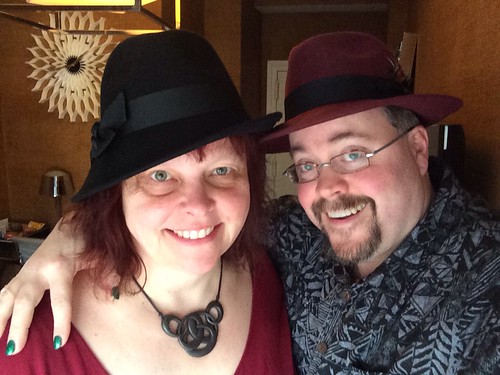
And Babbo itself, in Greenwich Village, looked like this:

And the interior looked like this:

Which is to say that it was a nice-looking interior, well put-together, but nothing particularly fancy. It’s comfortable dining, which is what Joe Bastianich desires: he wants casual business dress, and goes out of his way to keep a few seats free at lunch so anyone can drop by and have a chance of getting in. If you want formal, try Del Posto.
In any case, we were sat down at a little two-top, and before we got past the bread plate we discovered that no, none of the Cleveland restaurants were worthy of Michelin stars. The reason?
The service.
There was seemingly one waiter for every three tables, and there were other guys literally patrolling the floor, watching us intently, and our water glasses never dipped below half-full, our wine glass was never empty for more than a minute before someone was asking if we’d like another, the gap between the time we finished our primi and secundi was literally three minutes, tops. They were eyeing us like hawks, attentive to our every move…
…and yet it was not oppressive. I noticed because I’d worked in the service industry and always pay attention to how hard a waiter’s working, but the staff kept a discreet distance, maybe twenty feet away, pretending to be busying themselves with something but always glancing out of the corner of their eyes. It was a team effort, where they’d flick hand signals at each other to keep them apprised of us, and the waiters themselves were very skilled – we asked for a wine pairing, and our main waiter walked us through his thought process and then double-checked with the sommelier.
There is no service like this in Cleveland.
Which is not to say there could not be. If Michelin started ranking local restaurants, then the usual struggle for dominance would begin, and I’m pretty sure in three weeks we’d have all of Michael Symon’s restaurants ushering to us with this level of quality. But this sort of attentiveness has to be insanely expensive, and while it made for a lovely experience I’m not necessarily sure that I’d shell out for that staffing cost if I wasn’t trying to stand out in one of the most competitive markets in the world.
Then they brought the food. And the food was a revelation.
Now, we made a slight mistake in our restaurant choice if we were going to compare Cleveland to Michelin-starred restaurants, as Cleveland is not exactly a hotbed of authentic Italian cuisine. And in Restaurant Man, Joe Bastianich discusses how he flew out to Italy through his whole childhood with his world-class chef of a mother, and was determined to bring the native dining of his land to America, not these bastard translations of cheese-stuffed ziti.
So we’d never had what you’d call good pasta.
We sure have now.
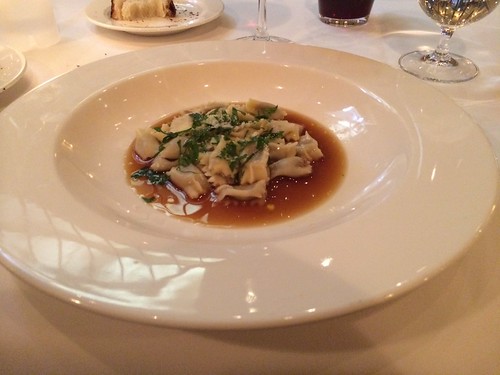
I had the pork shoulder agnolotti pasta, which looked delicious – until the guy poured the pork broth in from a little teapot, which was dark, reduced to a pure essence of pork flavor, and the whole thing became a work of art. The pasta was tissue-thin, parting easily under the teeth, with a little wad of soft meat on the inside, and if you got a little bit of that broth on it the whole thing blossomed with a delicious umami flavor that just kicked your fucking teeth in in the nicest of ways. This bowl was like a hug from a pig angel.
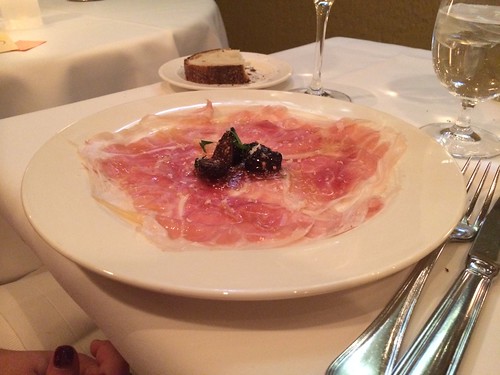
Gini had the prosciutto with a fig mostardi, and initially it looked like I’d won the appetizer course – as the prosciutto was tissue-thin and tasty, but still basically prosciutto. (We have some pretty good samples down at the West Side market.) But the fig mostardi was like a sweet, sumptuous candy, entwining with the thin meat to create a wonderful dance of savory and stickiness, and by that time that shimmered out of our mouths we weren’t sure who had won.
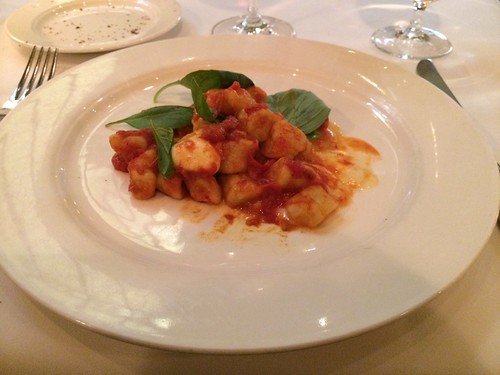
For primi, I had the gnocchi, which was, again, a revelation. I’d never had a gnocchi that wasn’t gluey on some level – and I’ve had a lot of gnocchi, since I like the idea of it – so I figured this was a feature of how gnocchi was, and had regretfully left it behind. But this gnocchi was velvety, literally melting at the touch of my saliva, touched with dabs of tomato sauce that, like the pork shoulder broth, had been reduced so that even a little toothpaste-sized dollop was as flavorful as a full bite.
The gnocchi was like the Transformers of meals, because at first I ate the bits with tomato, and that was great. Then I realized it had some mozzarella cheese on it, and that was great in a different way, all chewy and filled with a subtle cheese taste. And then I ate it with the basil leaves, and the crunchy leaves interacted with the tomato sauce in a really zippy fashion, and if there was a fourth way to eat it I didn’t discover it because GET IN MY BELLY.
I should note that I was also drinking three glasses of red wine along the way, which I never do because I don’t like wine all that much. White wine is just too light for me, lacking a boldness in taste, wherein red has that big bottomy taste that I love, but that taste I seek is inevitably accompanied by the big tannin suck that takes all the moisture from your mouth. But the waiter had selected a lovely little wine that skated right up to that tannin-suck and then dissolved into deliciousness and WAITER WAITER GET ME MORADIS DIS IS DELICIOUS.
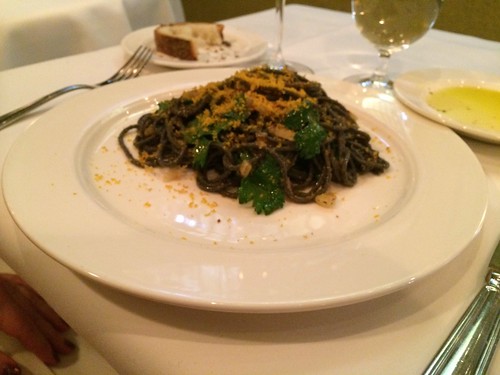
Gini had the black squid-ink spaghetti with jalapeno and some sort of nuts, which taught us what “al dente” should taste like. (Hint: In about fifty combined years of cooking pasta, neither of us had quite managed to nail that landing.) I was not a fan, as I’m repulsed by the taste of peppers, but even I had to admit it was a subtle flavor, balanced pretty well by the nuttiness. The pasta was excellent, but it was dinged a little bit by the fact that the pepper flavor was unevenly distributed, meaning that some bites were very overwhelmingly peppery to me and later samples had almost nothing at all.

And I fucked up on the main course. I had the lamb chop and beef tongue with sweetbreads, and they were all very well done – but there’s not a lot you can do with a lamb chop or beef tongue, honestly. They were top-tier, and Mario Batali had tried his best by pouring balsamic glaze over it, but in the end, it was meat, done well, but not really displaying the strength of Italian cuisine.
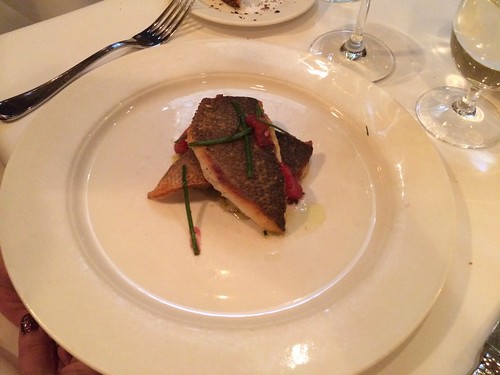
Gini got the branzino, mainly because Joe discussed the branzino at length many times in Restaurant Man, talking about how it’s the kind of fish served overseas but that you never see here, and rhapsodizing about how great it is. And it was seared wonderfully, perfectly even – you can see that in the photo – and Gini loved it. For me, I’m no big fan of fish, and it was, uh, fish.
Maybe Gini will talk about it, if you ask her nicely.
For dessert, I fucked up in a really great way. See, my Uncle Tommy was the man who introduced me to fine cuisine, taking this scrubby little sixteen-year-old picky eater out to good restaurants and encouraging him to try new things. He inculcated a deep love of dining in me, and whenever we dined out, we finished up with a cup of amaretto coffee. And to this day, whenever possible, I finish up every meal with a cup of amaretto coffee and toast to my Uncle.
So when I saw they had a tasting flight of amaro, I said, “Oh! That’s gotta be Italian for amaretto! And it’s a tasting flight? Tommy would kill me if I didn’t try it.” So I ordered.
As it turns out, amaro is not Italian for amaretto.
It is, however, delicious.

Amaro is a syrupy herbal liqueur, and as it turns out I like it – or at least some of it. The first glass was a little like amaretto, a light caramel color with a thick mouthfeel and a sugary finish laced with just the right amount of herbaceousness. The second glass was more serious, and a shade or two darker than Coke, and was a really great blend of sweet and bitters.
The third glass was undrinkable to me, in the exact same way that the Velvet Tango Room‘s Negroni is undrinkable – it’s well-made, and perfect for what it is, but it’s all acrid bitter medicinal flavors that I can’t tolerate. Gini, however, sucks down Negronis like there’s no tomorrow, and I pushed it to her. She finished it off before I could blink, sighing happily.
The desserts were good. The bill was about $300, sans tip. We tipped well.
So in the end, we’re left wondering what a three-star restaurant looks like. We’ll find out, as our plan is to go to Alinea in Chicago in a few months, scrimping and saving for our next culinary journey. Alinea will be totally different, as it is molecular gastronomy – Google that if you’re not familiar, it’s really cool – and we’ve never eaten at a molecular gastronomy restaurant, let alone the best in the world.
And yes. I’ll write that up, too. Any questions?

